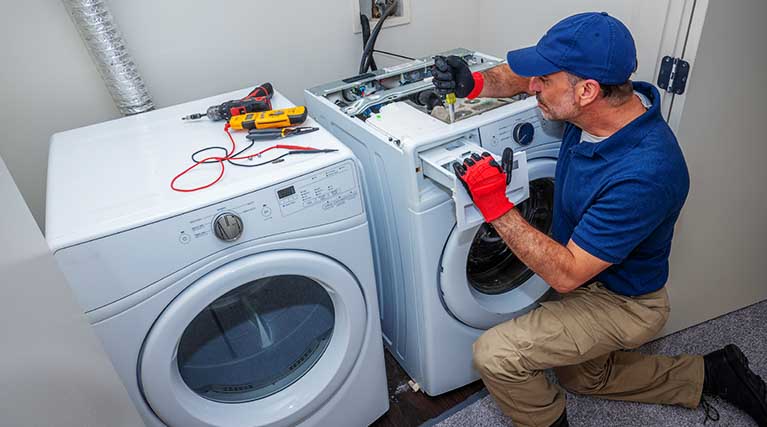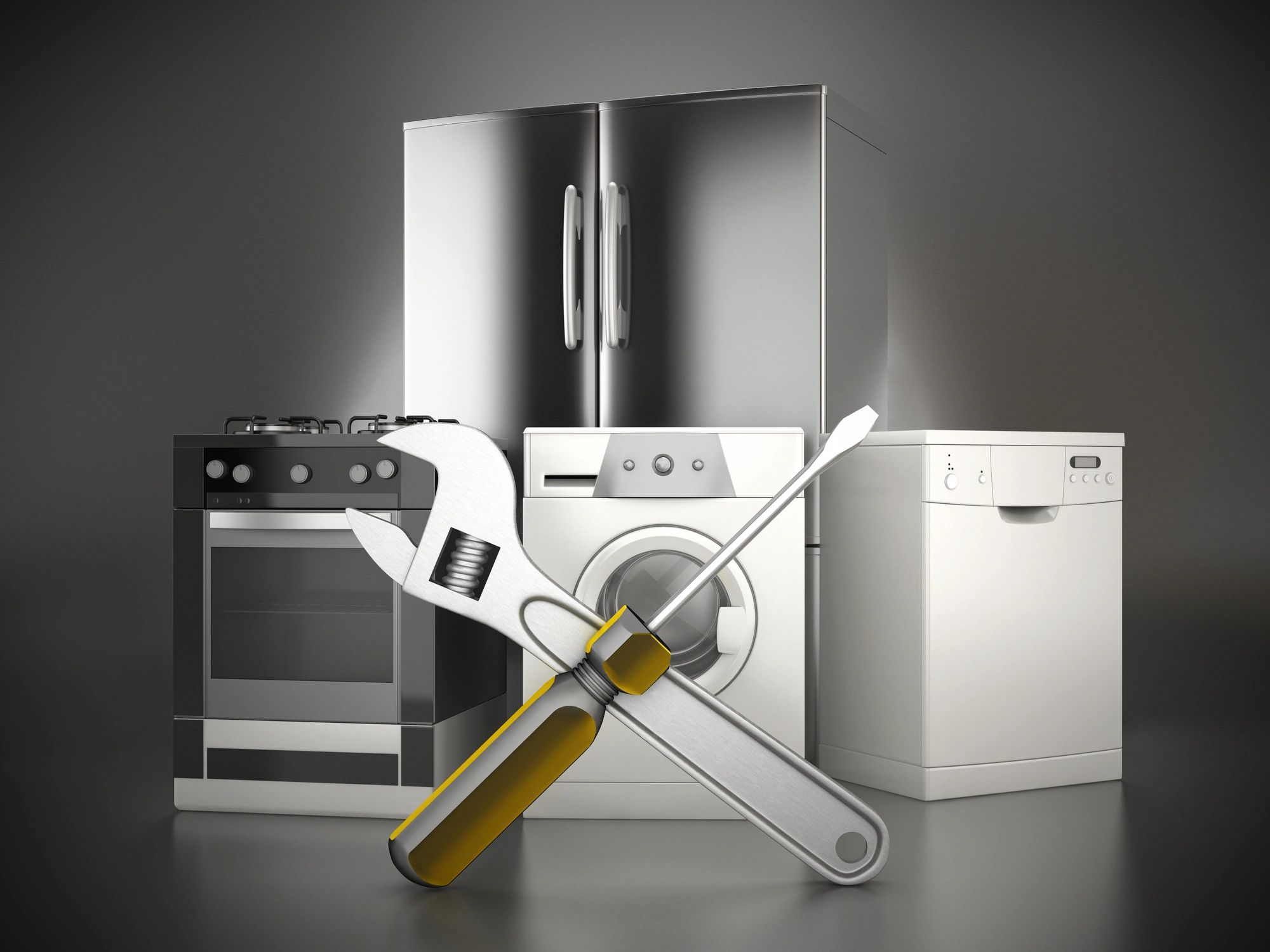The Ultimate Guide to Recognizing Home Appliance Fixing at Home
When your refrigerator stops cooling or your oven refuses to warm, it can feel frustrating. Recognizing appliance repair in your home can save you money and time. You'll discover to identify signs and symptoms, utilize crucial tools, and adhere to a systematic troubleshooting process. Yet before you begin, there are crucial safety precautions you need to think about. What are one of the most usual problems, and exactly how can you fix them? Let's explore the essentials.
Common Device Problems and Their Signs and symptoms
When your devices begin acting up, it's important to recognize the signs beforehand. Overlooking them can bring about bigger problems and expensive repair work. As an example, if your fridge isn't cooling properly, you might discover cozy areas or condensation developing. This might suggest a stopping working compressor or a blocked vent.Your dishwashing machine may show troubles with dirty meals or uncommon noises throughout cycles. If you listen to grinding or clanking, it's time to investigate.A washing machine that will not spin or drain pipes can leave you with soggy laundry, recommending a clogged up drain or a malfunctioning pump.Lastly, if your stove's temperature seems off or it takes for life to pre-heat, you may be taking care of a damaged thermostat. By remaining sharp to these signs and symptoms, you can deal with issues prior to they rise into significant repairs.
Necessary Tools for Device Repair Work
When you're taking on device repair services in the house, having the right devices is vital. Standard hand devices like screwdrivers and pliers will certainly assist you take apart and fix various devices, while electric screening gadgets assure you're functioning safely with wiring. Let's discuss what you need to get begun on your fixing trip.
Fundamental Hand Devices
Having the right tools is necessary for efficient device repair work in your home. Start with a trusted screwdriver collection, including both flathead and Phillips types, as screws prevail in home appliance setting up. Pliers are likewise essential; they aid with gripping, twisting, and reducing cables or small parts. A set of needle-nose pliers can get to difficult situations easily. You'll require a great flexible wrench for tightening or loosening up nuts and bolts. An utility blade comes in handy for cutting with product packaging or insulation. Don't fail to remember a strong workbench or surface to securely arrange your devices and parts. With these standard hand tools, you'll be well-prepared to tackle most appliance repair work that come your way.
Electric Testing Instruments
Along with fundamental hand devices, electric testing gadgets play a vital role in device repair service. These devices aid you identify electric issues and assurance home appliances function securely. A multimeter is vital; it determines voltage, present, and resistance, permitting you to pinpoint troubles rapidly. A non-contact voltage tester is an additional essential, letting you identify live cords without making direct get in touch with, improving your security. Secure meters are wonderful for measuring current circulation in wires without disconnecting them, saving you effort and time. Furthermore, circuit testers can promptly check if electrical outlets are operating correctly. By making use of these gadgets, you'll simplify your troubleshooting process and improve your repair abilities, making appliance upkeep a lot less complicated.
Step-by-Step Guide to Diagnosing Appliance Issues
When your home appliance acts up, it can be aggravating, yet detecting the concern doesn't have to be overwhelming. You'll learn to identify typical problems and use reliable repairing strategies. Let's go through the steps to get your home appliance back in functioning order.
Typical Device Problems

Fixing Methods Explained

Repairing Significant Kitchen Home Appliances: A Closer Look
Have you ever asked yourself exactly how to take on typical concerns with your kitchen appliances? Fixing significant kitchen devices like refrigerators, stoves, and dishwashing machines can be less complicated than you think. Begin by identifying the problem-- whether it's a refrigerator not cooling or an oven that won't heat up. Commonly, a simple reset or examining the source of power can address the issue.For fridges, tidy the condenser coils and inspect the door seals. If your stove's not heating, examine the heating component and thermostat. Dishwashing machines could just require a clean filter or a reset to get them back in activity. Constantly disconnect the appliance prior to diving right into repair services to ensure your safety.Don' t forget to get in touch with the user manual for details repairing tips connected to your version. With a little perseverance and the right devices, you can with confidence take on appliance repairs and conserve cash in the procedure!

Fixing Washing Devices: Tips and Techniques
When your washing devices start breaking down, it can feel overwhelming, however repairing them doesn't have to be a hassle. Start by inspecting the power supply. Verify the appliance is connected in and the electrical outlet is operating. Next, inspect the door or cover button; a damaged button can prevent the machine from operating.For washers, if it's not rotating, inspect for unbalanced loads. Rearranging the clothing might resolve the problem. If your dryer isn't heating, tidy the lint filter and check the vent for blockages.Listen for unusual noises; they can indicate an issue. If your device is dripping, inspect the hose pipes for fractures or loose connections. File any type of error codes presented on electronic screens, as they can direct you in recognizing the problem. Finally, consult the user manual for specific repairing pointers related to your design.
Safety Precautions to Take During Repairs
Prior to you start any kind of home appliance fixings, it's vital to focus on safety to stop crashes or injuries. Initially, unplug the appliance or switch off the breaker to assure no power reaches it while you function. Usage insulated devices to reduce the threat of electric shock. Wear safety goggles and handwear covers to safeguard yourself from sharp edges or debris (Fixes washers and dryers Oro valley Dependable Appliance Repair).Make specific your work space is tidy and well-lit, so you get more info can see what you're doing. Keep kids and animals away from the area to stay clear of diversions and prospective hazards. If you're managing gas devices, be extra mindful; check for leakages prior to proceeding.Take your time, and don't rush via repair work. If you really feel unclear concerning any action, it's far better to pause and research than to guess. Complying with these preventative measures will assist produce a much safer atmosphere for your do it yourself device repair project
When to Call a Professional for Help
How do you understand if it's time to contact a specialist for home appliance fixings? If you've tried standard troubleshooting without success, it's a clear indicator. For circumstances, if your appliance still won't start or shows uncommon noises after resetting it, don't wait to seek professional help.When you discover leaks, smoke, or burning smells, prioritize safety and call a professional quickly. These issues can bring about more significant damages or posture dangers to your home.Also, if your home appliance is under guarantee, calling a specialist is usually the most effective route. They can guarantee that fixings will not nullify your guarantee, saving you money in the lengthy run.Finally, if you're unclear or uneasy with complex repair services, it's a good idea to leave it to the specialists. Remember, taking on difficult concerns without the best know-how can lead to expensive mistakes. Count on a professional when unsure!
Regularly Asked Concerns
Just How Can I Prevent Device Issues in the Future?
To stop device issues in the future, you ought to perform routine maintenance, check for deterioration, tidy filters, and avoid overloading. Remaining aggressive will assist prolong their lifespan and keep them running efficiently.
What Are one of the most Typical DIY Appliance Fixing Mistakes?
You may ignore safety preventative measures, avoid fixing actions, or utilize incorrect devices when attempting DIY device fixings. Rushing the process or disregarding supplier guidelines can result in more significant problems and expensive blunders. Keep person and informed!
Exactly how Do I Know if a Part Needs Replacement?
You can inform if a component needs replacement by examining for uncommon noises, leakages, or irregular efficiency. If the device has a hard time to run appropriately or shows visible damage, it's likely time for a substitute.
Can I Make Use Of Generic Components for Appliance Repairs?
Yes, you can use common parts for home appliance repairs, yet determine they're compatible - Maytag Washing machine repair Dependable Refrigeration & Appliance Repair Service. Common parts might save you money, however they can influence performance or long life, so weigh your choices very carefully prior to choosing
What Guarantees Cover Appliance Repairs?
A lot of appliance guarantees cover fixings for manufacturing problems, yet they commonly omit damages from abuse. Examine your service warranty terms meticulously, as some may require making use of licensed professionals and original components for protection to stay valid.